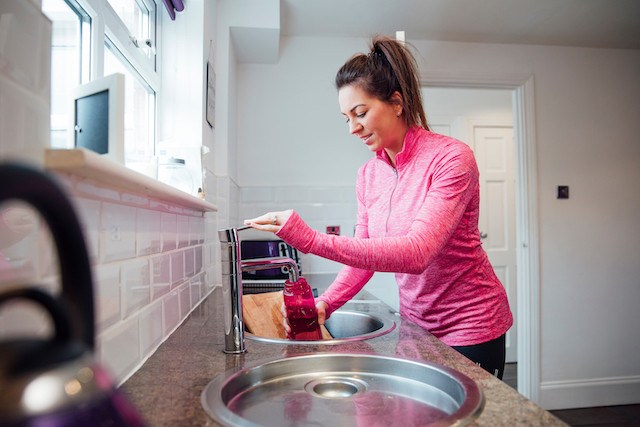The concept of Refill Lëtzebuerg started off a simple initiative: to get people to start using reusable bottles, while asking local businesses to provide free tap water to those customers. Two individuals--David Kieffer and Adela Fuentes--were working in parallel at the time on similar initiatives, without knowing it at first. Once they realised the idea(s) were taking off, they joined forces, and Refill Lëtzebuerg officially started last spring.
“There was a positive response, from consumers and businesses,” says Kieffer. “Businesses saw it was a promotion for them and they could acquire new customers, so it was pretty much a win-win concept.”
Kieffer, who studied engineering, said he is trained to “look for small measures with the biggest effects”. He had been trying to be more cognizant himself of carrying a resuable bottle, although he admitted that at the beginning, “I didn’t have it on me all the time. There wasn’t the reflex to carry it.”
Little by little, he says he changed his habits and realised others could do the same, adding that “people can start reconsidering what they do on a daily basis and see that there are alternatives.”
The Refill Lëtzebuerg group reached out to colleagues in Ireland and Germany to get best practices and tips (the latter even allowing them to use their logo), and today Kieffer says there are around 90 companies and institutions registered with Luxembourg, not to mention a number of public fountains available.
How it works
Many of the businesses registered in Luxembourg for the initiative are also available on the “Refill” smartphone app, which provides users access to a map showing refill stations not just in Luxembourg, but also several countries abroad. It’s something Kieffer--who has lived in Austria, Norway and France (where he said he got tap water if he asked for it)--says is convenient, as users don’t need a variety of apps when they go abroad, and they are sometimes surprised to find refill stations in even “very remote” locations.

The sticker designated for official refill stations Photo: Refill Lëtzebuerg/Facebook
Companies interested in participating can simply get in touch with Refill Lëtzebuerg. “Normally the businesses ask us to participate, and we tell them they have to just provide [their business hours], they need some sort of fixed schedule, so not private homeowners,” Kieffer says.
The business, once approved, gets a sticker from Refill Lëtzebuerg which they can display in their window, so it’s clear to customers that it’s a refill station. The team then posts on Facebook which, in turn, gives the business some additional visibility. So far, says Kieffer, “Our resources were limited, so companies approached us…it’s been a self-supporting system.”
Next steps
Kieffer says that most of the businesses are actually not in the food sector--think companies like Ouni, the container-free grocery store, plus communes and youth centres--but he hopes that will change. “That’s a topic we are aiming at addressing soon. When you come to the point where you accept [tap] water in a bottle, why not accept it in your glass at a restaurant?”
They haven’t yet received a complaint, given that there is a formalised permission process to be listed as an official refill station. But if someone were to be turned away, customers can get in touch with the team so they can look into the complaint.
But so far feedback has been positive. Kieffer knows that it is hard to avoid plastic at all costs, but that individuals should find the measures that work for them as they aim to help the environment, whether it is shopping without plastics, biking to work, or avoiding flying in an airplane just for a long weekend.
“For one person, avoiding a car might work better than reducing plastic. They’re two pieces to the same puzzle,” Kieffer says, adding: "It’s important people don’t feel forced but that they are invited and encouraged to try new things so they can reconsider what they do.”
